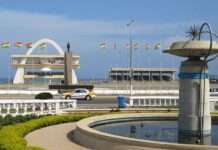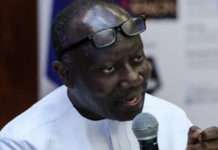After the approval of the Electronic Transactions Levy, Vice President Dr Mahamudu Bawumia released his State of the Economy report.
On Thursday evening, the Vice-President addressed at an event hosted by the New Patriotic Party’s Tertiary Education Confederacy.
As he boasted loudly when in opposition, Dr Bawumia offered some explanations on what happened to the economic fundamentals.
In the midst of the present issues, he took advantage of the chance to break his economic quiet, which has prompted detractors to question his silence.
Vice president Bawumia also went into detail about what the government was doing to alleviate Ghanaians’ suffering, as well as where the new economy that the government vowed to develop was, and how the commitment to shift the economy away from taxes and toward production was being implemented.
On Thursday, April 7, he told TESCON members that Russia supplies 30% of Ghana’s imported cereals, 50% of flour, and 39% of fertiliser.
As a result, he added, the conflict had an impact on the local economy.
“The increase in commodity prices has been exacerbated by the Russia-Ukraine conflict. Russia and Ukraine together account for 30% of the global wheat export. The longer the conflict the greater will be the disruptions to global food supply. The country is also likely to slow global growth,” he said.
Dr Bawumia added, “the path of inflation in Ghana has been similar to those of other countries following the COVID pandemic. Inflation had declined from an average of 17.5% in 2016 to an average of 7.2% in 2020. Since the pandemic, inflation has increased to an average of 10% in 2021.”
Despite COVID-19, Bawumia claims that interest rates are presently lower than they were from 2013 to 2016.
“Before COVID-19, the steady disinflation process provided scope for significant monetary policy easing. The Bank of Ghana’s Monetary Policy Rate (MPR) was cut by a cumulative 11% between January 2017 and January 2021.”
He added, “this translated into a reduction in short term interest rates, with the interest rate on the 91-day Treasury bill declining from an average of 21.2% between 2013 and 2016 to an average of 13.8% between 2017 and 2021. Lending rates have also fallen from an average of 28% between 2013 and 2016 to an average of 23% between 2017 and 2021.”
The Bank of Ghana has lifted the policy rate by 2.5%, from 14.5% to 17.0%, in reaction to the recent spike in inflation, according to Bawumia.
The country’s solid economic fundamentals, according to Bawumia, are a result of the Akufo-Addo administration’s strict fiscal discipline.
“The developments in the fiscal balance show a remarkable and sharp dichotomy between the fiscal deficit (ie. the 23 differences between government revenue and government expenditure) before the COVID-19 and after COVID-19. The fiscal deficit between 2013 and 2016 averaged 7% of GDP. Between 2017 and 2019 (before COVID-19), the fiscal deficit declined to an average of 4.5%.
“For the first time in a decade, Ghana recorded primary balance surpluses (for three years in a row). To sustain the path of fiscal discipline, parliament passed into law a Fiscal Responsibility Act that limits the fiscal deficit in any year to a maximum of 5% of GDP and requires a positive primary balance (that is our tax revenues should exceed all government spending, excluding debt service payments),” he said.
He expressed concern about a variety of other issues as well.
“The economy is what we feel in our pockets. I acknowledge that we are going through difficult times, this is the reality. Our economy is experiencing rising prices of fuel and virtually all commodities. Prices are on the rise.
“These have come at a surprise to many Ghanaians and many questions have been asked about the state of the economy. These questions include what has happened to the fundamentals? Why are the prices of goods and services increasing so fast? Why has the Cedi depreciated so fast this year?
“What programess does the government have to show for the higher debt? Where is the new economy that the government promised to build? I will address these questions based on data and fact.
“I will admit where there have challenges and we will all leave here with a better state of the economy, where we have come from and where we are going.”
Consequently, Bawumia stated that the government has taken steps to alleviate the hardships that the people are experiencing.
According to Vice-President Dr Mahamudu Bawumia, Ghana Revenue Authority (GRA) will soon unveil a tax filing mobile application to allow the public to file tax returns and get tax clearing certificates.
“Going forward, nobody will have to go and apply for tax clearance certificate,” he added, “the era of fake tax certificate is about to end.”
Bawumia stated, the manual method of filing taxes at the GRA offices was inconvenient, and this has discouraged many individuals from doing so.
He also mentioned that the launch of the tax filling App would aid in the fight against the corruption that has engulfed the tax system.
SOURCE: NEWS AGENCIES








